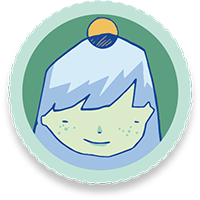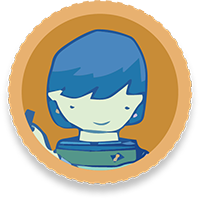Cancer can impact relationships in good and bad ways.
While some relationships are stronger for the experience, it may place stress on others. Many young people find it hard to manage dealing with the impact cancer has had on themselves while also dealing with the impact it has had on people around them. It’s normal to notice changes in the way you relate to family, friends, partners and other people in your life- and the way they relate to you.
The information here is to help you talk about your cancer experience, understand the impact it may have had on important people in your life, and give you suggestions on how to strengthen or manage challenges in your relationships with those around you.

TALKING ABOUT CANCER WITH OTHERS
Talking about your cancer experience- especially with new people - can be difficult. Deciding what or how much to share is a personal choice. Some people share everything, whilst others decide not to share anything at all.
Whatever your preference is, here are some things you may want to consider, with some helpful tips at the end.
TELLING FRIENDS, INCLUDING NEW FRIENDS
Many young people share their cancer experience with friends, so when treatment ends, keeping them informed is something that continues quite naturally. For others, the decision to inform friends only occurs once treatment has finished. You may also make new friends along the way, which can leave you feeling unsure about whether or how to talk about what you’ve been through.
It is generally best to be honest, sharing only the level of detail you feel comfortable with. Keeping your cancer experience a secret may be more stressful than actually talking about it. Providing some insight into your experience can help friends understand and support you better. With new friends, make sure you feel comfortable and are sharing for the right reasons. You may need to be prepared for a whole range of reactions. New friends won’t have expectations based on how you ‘used to’ be, act or feel and so in some ways, this can be helpful.
WHAT ABOUT NEW PARTNERS?
You may have been single or in a relationship during treatment, or you may have experienced a relationship break. Either way, there may come a time down the track when you start a new relationship, and many young people worry about what and when to share with a new partner. Some common worries are: if I share that I have had cancer, the relationship may not work; if he/she knows that I may not be able to have children, the relationship may not work; how can I ‘burden’ a new partner with this knowledge and how do I even begin to share something so personal.
Choosing when and how to tell a partner is a very personal choice, and there are no right or wrong approaches. You may want to wait until you feel the relationship is becoming serious before sharing your experience. Whatever you choose, try to talk at a time when you are both relaxed, and be open and honest about any concerns you have, encouraging your partner to do the same.
Good communication is key to lasting relationships, old or new.

INFORMING SCHOOLS, UNIVERSITIES, TAFE, COLLEAGUES AND EMPLOYERS
As you return to school, university, TAFE or work you may come into contact with people who are aware that you have been unwell or don’t really know what you have been through.
Working out what you want to tell them can be tricky. Remember that it is your decision if and how much you’d like to share. Telling your school, university, TAFE or work can be helpful as they can provide you with support when you return. The amount of information you share may depend on the impact of your treatment and what your needs are.
Some young people find it easier to decide what information people are told but leave it to the significant others in their life to ‘do the telling’, as it means you don’t have to keep repeating your story. For example, before you return to school you might meet with your year coordinator to give them information on what you would like other students to be told. If you’re working, you might ask your manager to pass on information to other staff members.

TEN TIPS FOR TALKING ABOUT YOUR CANCER EXPERIENCE
- Remember that it is normal and common to worry about telling others. Most young people have similar concerns.
- Think about what will make you feel comfortable and ready. You might be ok with telling people upfront or you might want to wait until you feel more comfortable around them and have gained their trust.
- Work out how you feel, your reasons for telling and what you expect of someone before discussing your experience with them.
- Plan how and what to say. It may be useful to write it down and practice either by yourself or with someone who knows about your experience.
- Be aware that other people may need some time to take in the information before they are ready to talk about it properly.
- Be prepared for varying reactions. People react differently to big news so try to be ready for this. There may be some awkward reactions to deal with.
- Let others know what you need. Finishing treatment means that you may be trying to cope with a number of side effects. Your friends, classmates and/or work colleagues will be willing to help if they know what you need.
- Consider different ways of informing your school, TAFE, uni or workplace. Some people find it harder to tell people face-to-face. If it’s easier you can inform them via letter or email. You can follow up with discussion at a later stage, when you are more comfortable.
- Allow others in your life to share information. Ask people you trust to pass on updates or have the discussion on your behalf. It is ok not to do it all yourself.
- Seek professional guidance if required. This can be through your GP or a member of your treating team.
SHARING ONLINE
Sharing your experience on social media and other forums can be powerful. It can make it easier to connect with people who have been through something similar. You may also find that sharing and communicating with others online helps you deal with your experience.
Social media and other technology can also be a fantastic way to keep people up to date without having to have the same conversation many times. That said, it is really important to be careful about how and what you share in these spaces.
- Adjust your privacy and security settings to ensure only the people you want to see the information you are posting are able to do so.
- Make sure that people close to you are aware of what and how much information you want to be shared to avoid unwanted sharing of your information by others.
- Before you post a message, photo or any other information online, stop and ask yourself: would I be okay with my friends, family, school, TAFE, uni, current or future employer seeing this? If not, reconsider- anything you post can remain on the internet for years to come (even if you delete it).

YOUR RELATIONSHIPS
Many people experience changes in their relationships during or after treatment. Below are some common experiences and tips for strengthening relationships and managing any challenges.
RELATIONSHIPS WITH PARENTS/CARERS
Whether you were living with your parent(s)/carer(s) or not during treatment, cancer can really impact your relationships with them.
You may have had to rely on them more than usual and it might have felt like you lost independence in a whole range of ways. Even after treatment, your relationship with your parent(s)/carer(s) may not return to what it was like before. It often requires a discussion and re-negotiating roles and responsibilities to help you gain back your independence and build confidence. It can take time to find a new balance that works.
TIPS:
- Talk to your parent(s) or carer(s) about what’s important to you now that you have completed treatment. Be honest with them and hear what they say is important to them too.
- Negotiate the ways your parent(s)/carer(s) may still be involved in your follow up care, such as coming along to a medical review if you feel comfortable.
- Think about small ways you can regain your independence over time, rather than trying to adopt an ‘only all’ approach. This may work positively for both you and your parent(s)/carer(s) as they still get to remain somewhat involved.
- Remember communication is key, so take some time to talk to your parent(s)/carer(s) about how you’re feeling and what you need.

RELATIONSHIPS WITH SIBLINGS
Siblings are affected when a brother or sister has cancer and have their own unique cancer experience. Some have had to take on more roles and responsibilities, especially at home. They are often faced with complex and conflicting emotions. Many say they have felt guilty, scared, angry, sad and even jealous. Like you, it’s not something they signed up for.
You have probably found by now that cancer can bring some siblings closer, and push others further apart. Some young people believe that when treatment ends, relationships with siblings will return to how they were before, but this may not be the case. You may need to find a different or new way to communicate or relate to your siblings and this can be challenging.
TIPS:
- Take some time to talk to siblings about your cancer experience and at the same time, to hear about theirs.
- Acknowledge that there may have been changes to roles and responsibilities at home and try and work out together how to approach things now.
- Make the effort to spend some time together doing something enjoyable.
- Ask for help from your parent(s) or carer(s) if you think this will be helpful.

RELATIONSHIPS WITH PARTNERS
Cancer can bring out the best and the worst and put a strain on even the longest or strongest relationships.
Sometimes there is a new dynamic created when treatment finishes. If treatment has been the focus for both of you, suddenly you have time for other things, all of which should be good but can sometimes feel weird or hard somehow. You may also have ongoing treatment effects that can impact your relationship, and you may both be struggling with a whole range of similar or completely different emotions.
Talking honestly about feelings and concerns- and respecting any differences between you - is so important to preserving and building closeness in your relationship. Do your best to keep the lines of communication open and acknowledge the shared and individual experiences of what you’ve both been through.

RELATIONSHIPS WITH FRIENDS
Your relationships with friends may change after treatment and this can come as a surprise.
Some friends may not be prepared for or understand the changes you may have undergone. They may think that now that you’ve finished treatment and ‘look fine’, you must be ‘feeling fine,’ and don’t understand why that isn’t always the case.
Sometimes friends can disappear or you begin to feel like you don’t have as much in common any more. It is normal for friendships to change over time, growing closer to some and further apart from others in ways that may or may not be related to your cancer experience. Try to spend your time and energy on the relationships that matter most to you.
RELATIONSHIPS WITH CHILDREN
Like many adults, children may find it hard to understand why things can’t simply go back to the way they were before cancer.
Since finishing treatment, you may be worried about how your child will adjust to any changes. There’s a good chance they have already faced some big and scary issues and may have ongoing concerns or worries.
Like adults, all children cope differently, so the level of support they need will also vary. Younger children may not display any obvious worry but you may notice changes in behaviour. Older children may have expectations on you to quickly bounce back or have questions about the cancer returning. It is not always easy to respond to the needs of children, and may be helpful.
TIPS FOR RELATIONSHIPS AFTER TREATMENT
- Let the important people in your life know you understand your experience may have been hard for them too. Start the conversation as others may not know where to begin or what to say.
- Be open with others about where you’re at and what you need from them. People may be expecting you to get ‘back to normal’ when you feel very far from it. You may also find you can’t get back to doing the things you used to as quickly as you thought you would, or in the same way. Communicating this to others can help them better understand and support you.
- It can help to write down your thoughts and feelings prior to a discussion to clarify what you want to say and how you want to say it.
- Be patient and kind to yourself and others. You may find yourself becoming frustrated with those close to you. Try to remember that the people around you have good intentions but may not know what to do or how to say what they need to.
- Keep the relationships that matter. Expect that some relationships will change for better or worse and that you may not feel the same about them anymore. Try not to expend a lot of emotional energy trying to patch up relationships that may not have been strong to begin with. Invest your time and energy in those closest to you.
- Talk to your treating team or GP if you have ongoing concerns about communicating with family, your partner or friends, or are struggling with your children. Don’t be afraid to ask for help.
USEFUL LINKS AND RESOURCES
CanTeen has a range of resources that relate to relationships during and after cancer treatment for young people, their families and friends.
FOR YOU:
- Now what? Your guide to dealing with cancer (15-25 year olds) - the ‘life stuff’ section of this resource has a wealth of information about relationships during and after treatment
- Relationships after cancer - webpage with information and videos
- Maybe later baby? A guide to relationships, sex and fertility for young people after cancer - while much of the information in this resource relates to fertility, it also talks about body image and all aspects of intimate relationships





